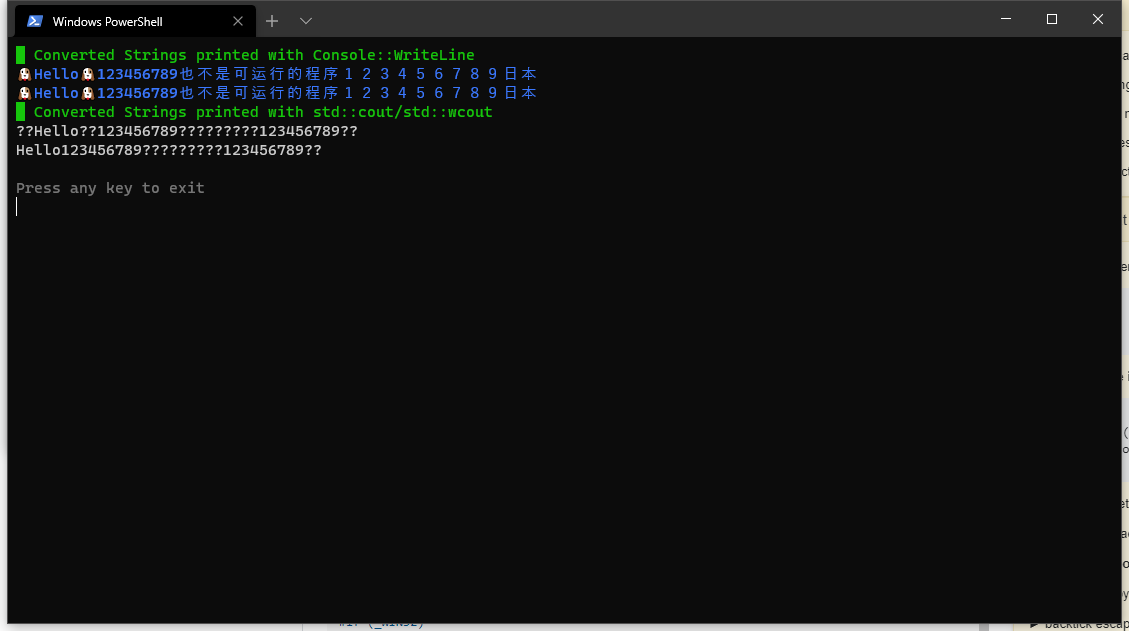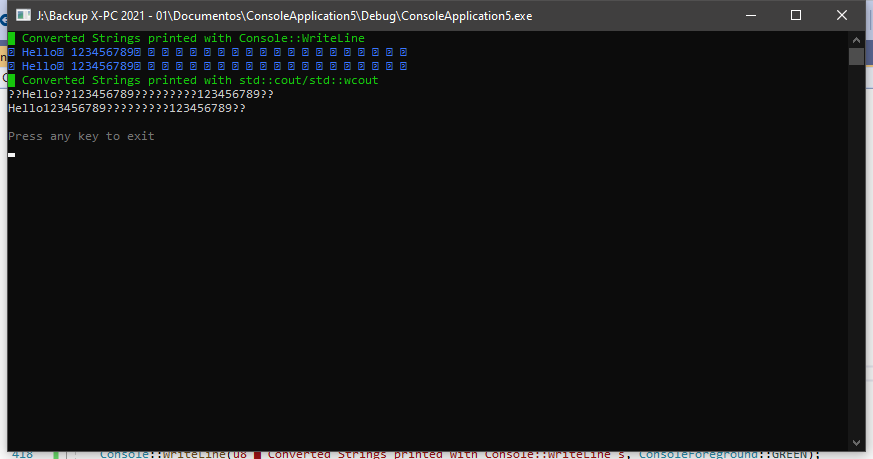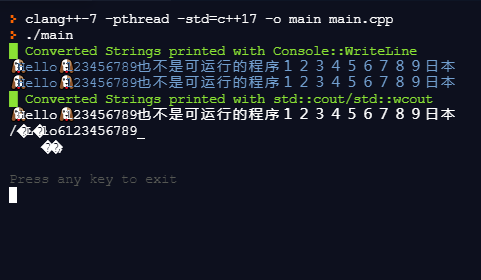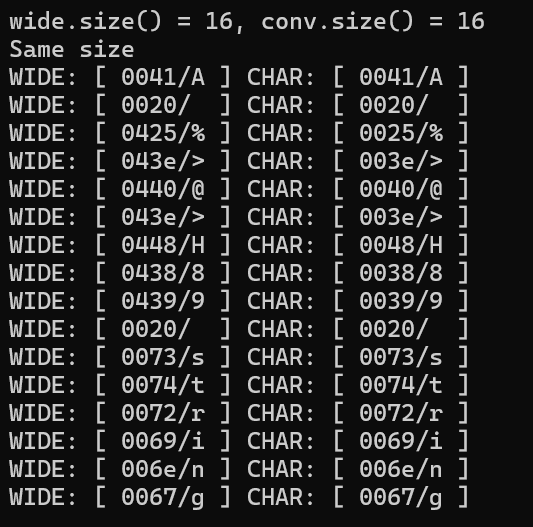Default encoding on:
- Windows UTF-16.
- Linux UTF-8.
- MacOS UTF-8.
My solution Steps, includes null chars \0 (avoid truncated). Without using functions on windows.h header:
- Add Macros to detect Platform.
Windows/Linux and others
- Create function to convert std::wstring to std::string and inverse std::string to std::wstring
- Create function for print
- Print std::string/ std::wstring
Check RawString Literals. Raw String Suffix.
Linux Code. Print directly std::string using std::cout, Default Encoding on Linux is UTF-8, no need extra functions.
On Windows if you need to print unicode. We can use WriteConsole for print unicode chars from std::wstring.
Finally on Windows. You need a powerfull and complete view support for unicode chars in console.
I recommend Windows Terminal
QA
- Tested on Microsoft Visual Studio 2019 with VC++; std=c++17. (Windows Project)
- Tested on repl.it using Clang compiler; std=c++17.
Q. Why you not use <codecvt> header functions and classes?.
A. Deprecate Removed or deprecated features impossible build on VC++, but no problems on g++. I prefer 0 warnings and headaches.
Q. std ::wstring is cross platform?
A. No. std::wstring uses wchar_t elements. On Windows wchar_t size is 2 bytes, each character is stored in UTF-16 units, if character is bigger than U+FFFF, the character is represented in two UTF-16 units(2 wchar_t elements) called surrogate pairs. On Linux wchar_t size is 4 bytes each character is stored in one wchar_t element, no needed surrogate pairs. Check Standard data types on UNIX, Linux, and Windowsl.
Q. std ::string is cross platform?
A. Yes. std::string uses char elements. char type is guaranted that is same byte size in most compilers. char type size is 1 byte. Check Standard data types on UNIX, Linux, and Windowsl.
Full example code
#include <iostream>
#include <set>
#include <string>
#include <locale>
// WINDOWS
#if (_WIN32)
#include <Windows.h>
#include <conio.h>
#define WINDOWS_PLATFORM 1
#define DLLCALL STDCALL
#define DLLIMPORT _declspec(dllimport)
#define DLLEXPORT _declspec(dllexport)
#define DLLPRIVATE
#define NOMINMAX
//EMSCRIPTEN
#elif defined(__EMSCRIPTEN__)
#include <emscripten/emscripten.h>
#include <emscripten/bind.h>
#include <unistd.h>
#include <termios.h>
#define EMSCRIPTEN_PLATFORM 1
#define DLLCALL
#define DLLIMPORT
#define DLLEXPORT __attribute__((visibility("default")))
#define DLLPRIVATE __attribute__((visibility("hidden")))
// LINUX - Ubuntu, Fedora, , Centos, Debian, RedHat
#elif (__LINUX__ || __gnu_linux__ || __linux__ || __linux || linux)
#define LINUX_PLATFORM 1
#include <unistd.h>
#include <termios.h>
#define DLLCALL CDECL
#define DLLIMPORT
#define DLLEXPORT __attribute__((visibility("default")))
#define DLLPRIVATE __attribute__((visibility("hidden")))
#define CoTaskMemAlloc(p) malloc(p)
#define CoTaskMemFree(p) free(p)
//ANDROID
#elif (__ANDROID__ || ANDROID)
#define ANDROID_PLATFORM 1
#define DLLCALL
#define DLLIMPORT
#define DLLEXPORT __attribute__((visibility("default")))
#define DLLPRIVATE __attribute__((visibility("hidden")))
//MACOS
#elif defined(__APPLE__)
#include <unistd.h>
#include <termios.h>
#define DLLCALL
#define DLLIMPORT
#define DLLEXPORT __attribute__((visibility("default")))
#define DLLPRIVATE __attribute__((visibility("hidden")))
#include "TargetConditionals.h"
#if TARGET_OS_IPHONE && TARGET_IPHONE_SIMULATOR
#define IOS_SIMULATOR_PLATFORM 1
#elif TARGET_OS_IPHONE
#define IOS_PLATFORM 1
#elif TARGET_OS_MAC
#define MACOS_PLATFORM 1
#else
#endif
#endif
typedef std::string String;
typedef std::wstring WString;
#define EMPTY_STRING u8""s
#define EMPTY_WSTRING L""s
using namespace std::literals::string_literals;
class Strings
{
public:
static String WideStringToString(const WString& wstr)
{
if (wstr.empty())
{
return String();
}
size_t pos;
size_t begin = 0;
String ret;
#if WINDOWS_PLATFORM
int size;
pos = wstr.find(static_cast<wchar_t>(0), begin);
while (pos != WString::npos && begin < wstr.length())
{
WString segment = WString(&wstr[begin], pos - begin);
size = WideCharToMultiByte(CP_UTF8, WC_ERR_INVALID_CHARS, &segment[0], segment.size(), NULL, 0, NULL, NULL);
String converted = String(size, 0);
WideCharToMultiByte(CP_UTF8, WC_ERR_INVALID_CHARS, &segment[0], segment.size(), &converted[0], converted.size(), NULL, NULL);
ret.append(converted);
ret.append({ 0 });
begin = pos + 1;
pos = wstr.find(static_cast<wchar_t>(0), begin);
}
if (begin <= wstr.length())
{
WString segment = WString(&wstr[begin], wstr.length() - begin);
size = WideCharToMultiByte(CP_UTF8, WC_ERR_INVALID_CHARS, &segment[0], segment.size(), NULL, 0, NULL, NULL);
String converted = String(size, 0);
WideCharToMultiByte(CP_UTF8, WC_ERR_INVALID_CHARS, &segment[0], segment.size(), &converted[0], converted.size(), NULL, NULL);
ret.append(converted);
}
#elif LINUX_PLATFORM || MACOS_PLATFORM || EMSCRIPTEN_PLATFORM
size_t size;
pos = wstr.find(static_cast<wchar_t>(0), begin);
while (pos != WString::npos && begin < wstr.length())
{
WString segment = WString(&wstr[begin], pos - begin);
size = wcstombs(nullptr, segment.c_str(), 0);
String converted = String(size, 0);
wcstombs(&converted[0], segment.c_str(), converted.size());
ret.append(converted);
ret.append({ 0 });
begin = pos + 1;
pos = wstr.find(static_cast<wchar_t>(0), begin);
}
if (begin <= wstr.length())
{
WString segment = WString(&wstr[begin], wstr.length() - begin);
size = wcstombs(nullptr, segment.c_str(), 0);
String converted = String(size, 0);
wcstombs(&converted[0], segment.c_str(), converted.size());
ret.append(converted);
}
#else
static_assert(false, "Unknown Platform");
#endif
return ret;
}
static WString StringToWideString(const String& str)
{
if (str.empty())
{
return WString();
}
size_t pos;
size_t begin = 0;
WString ret;
#ifdef WINDOWS_PLATFORM
int size = 0;
pos = str.find(static_cast<char>(0), begin);
while (pos != std::string::npos) {
std::string segment = std::string(&str[begin], pos - begin);
std::wstring converted = std::wstring(segment.size() + 1, 0);
size = MultiByteToWideChar(CP_UTF8, MB_ERR_INVALID_CHARS, &segment[0], segment.size(), &converted[0], converted.length());
converted.resize(size);
ret.append(converted);
ret.append({ 0 });
begin = pos + 1;
pos = str.find(static_cast<char>(0), begin);
}
if (begin < str.length()) {
std::string segment = std::string(&str[begin], str.length() - begin);
std::wstring converted = std::wstring(segment.size() + 1, 0);
size = MultiByteToWideChar(CP_UTF8, MB_ERR_INVALID_CHARS, segment.c_str(), segment.size(), &converted[0], converted.length());
converted.resize(size);
ret.append(converted);
}
#elif LINUX_PLATFORM || MACOS_PLATFORM || EMSCRIPTEN_PLATFORM
size_t size;
pos = str.find(static_cast<char>(0), begin);
while (pos != String::npos)
{
String segment = String(&str[begin], pos - begin);
WString converted = WString(segment.size(), 0);
size = mbstowcs(&converted[0], &segment[0], converted.size());
converted.resize(size);
ret.append(converted);
ret.append({ 0 });
begin = pos + 1;
pos = str.find(static_cast<char>(0), begin);
}
if (begin < str.length())
{
String segment = String(&str[begin], str.length() - begin);
WString converted = WString(segment.size(), 0);
size = mbstowcs(&converted[0], &segment[0], converted.size());
converted.resize(size);
ret.append(converted);
}
#else
static_assert(false, "Unknown Platform");
#endif
return ret;
}
};
enum class ConsoleTextStyle
{
DEFAULT = 0,
BOLD = 1,
FAINT = 2,
ITALIC = 3,
UNDERLINE = 4,
SLOW_BLINK = 5,
RAPID_BLINK = 6,
REVERSE = 7,
};
enum class ConsoleForeground
{
DEFAULT = 39,
BLACK = 30,
DARK_RED = 31,
DARK_GREEN = 32,
DARK_YELLOW = 33,
DARK_BLUE = 34,
DARK_MAGENTA = 35,
DARK_CYAN = 36,
GRAY = 37,
DARK_GRAY = 90,
RED = 91,
GREEN = 92,
YELLOW = 93,
BLUE = 94,
MAGENTA = 95,
CYAN = 96,
WHITE = 97
};
enum class ConsoleBackground
{
DEFAULT = 49,
BLACK = 40,
DARK_RED = 41,
DARK_GREEN = 42,
DARK_YELLOW = 43,
DARK_BLUE = 44,
DARK_MAGENTA = 45,
DARK_CYAN = 46,
GRAY = 47,
DARK_GRAY = 100,
RED = 101,
GREEN = 102,
YELLOW = 103,
BLUE = 104,
MAGENTA = 105,
CYAN = 106,
WHITE = 107
};
class Console
{
private:
static void EnableVirtualTermimalProcessing()
{
#if defined WINDOWS_PLATFORM
HANDLE hOut = GetStdHandle(STD_OUTPUT_HANDLE);
DWORD dwMode = 0;
GetConsoleMode(hOut, &dwMode);
if (!(dwMode & ENABLE_VIRTUAL_TERMINAL_PROCESSING))
{
dwMode |= ENABLE_VIRTUAL_TERMINAL_PROCESSING;
SetConsoleMode(hOut, dwMode);
}
#endif
}
static void ResetTerminalFormat()
{
std::cout << u8"\033[0m";
}
static void SetVirtualTerminalFormat(ConsoleForeground foreground, ConsoleBackground background, std::set<ConsoleTextStyle> styles)
{
String format = u8"\033[";
format.append(std::to_string(static_cast<int>(foreground)));
format.append(u8";");
format.append(std::to_string(static_cast<int>(background)));
if (styles.size() > 0)
{
for (auto it = styles.begin(); it != styles.end(); ++it)
{
format.append(u8";");
format.append(std::to_string(static_cast<int>(*it)));
}
}
format.append(u8"m");
std::cout << format;
}
public:
static void Clear()
{
#ifdef WINDOWS_PLATFORM
std::system(u8"cls");
#elif LINUX_PLATFORM || defined MACOS_PLATFORM
std::system(u8"clear");
#elif EMSCRIPTEN_PLATFORM
emscripten::val::global()["console"].call<void>(u8"clear");
#else
static_assert(false, "Unknown Platform");
#endif
}
static void Write(const String& s, ConsoleForeground foreground = ConsoleForeground::DEFAULT, ConsoleBackground background = ConsoleBackground::DEFAULT, std::set<ConsoleTextStyle> styles = {})
{
#ifndef EMSCRIPTEN_PLATFORM
EnableVirtualTermimalProcessing();
SetVirtualTerminalFormat(foreground, background, styles);
#endif
String str = s;
#ifdef WINDOWS_PLATFORM
WString unicode = Strings::StringToWideString(str);
WriteConsole(GetStdHandle(STD_OUTPUT_HANDLE), unicode.c_str(), static_cast<DWORD>(unicode.length()), nullptr, nullptr);
#elif defined LINUX_PLATFORM || defined MACOS_PLATFORM || EMSCRIPTEN_PLATFORM
std::cout << str;
#else
static_assert(false, "Unknown Platform");
#endif
#ifndef EMSCRIPTEN_PLATFORM
ResetTerminalFormat();
#endif
}
static void WriteLine(const String& s, ConsoleForeground foreground = ConsoleForeground::DEFAULT, ConsoleBackground background = ConsoleBackground::DEFAULT, std::set<ConsoleTextStyle> styles = {})
{
Write(s, foreground, background, styles);
std::cout << std::endl;
}
static void Write(const WString& s, ConsoleForeground foreground = ConsoleForeground::DEFAULT, ConsoleBackground background = ConsoleBackground::DEFAULT, std::set<ConsoleTextStyle> styles = {})
{
#ifndef EMSCRIPTEN_PLATFORM
EnableVirtualTermimalProcessing();
SetVirtualTerminalFormat(foreground, background, styles);
#endif
WString str = s;
#ifdef WINDOWS_PLATFORM
WriteConsole(GetStdHandle(STD_OUTPUT_HANDLE), str.c_str(), static_cast<DWORD>(str.length()), nullptr, nullptr);
#elif LINUX_PLATFORM || MACOS_PLATFORM || EMSCRIPTEN_PLATFORM
std::cout << Strings::WideStringToString(str);
#else
static_assert(false, "Unknown Platform");
#endif
#ifndef EMSCRIPTEN_PLATFORM
ResetTerminalFormat();
#endif
}
static void WriteLine(const WString& s, ConsoleForeground foreground = ConsoleForeground::DEFAULT, ConsoleBackground background = ConsoleBackground::DEFAULT, std::set<ConsoleTextStyle> styles = {})
{
Write(s, foreground, background, styles);
std::cout << std::endl;
}
static void WriteLine()
{
std::cout << std::endl;
}
static void Pause()
{
char c;
do
{
c = getchar();
std::cout << "Press Key " << std::endl;
} while (c != 64);
std::cout << "KeyPressed" << std::endl;
}
static int PauseAny(bool printWhenPressed = false, ConsoleForeground foreground = ConsoleForeground::DEFAULT, ConsoleBackground background = ConsoleBackground::DEFAULT, std::set<ConsoleTextStyle> styles = {})
{
int ch;
#ifdef WINDOWS_PLATFORM
ch = _getch();
#elif LINUX_PLATFORM || MACOS_PLATFORM || EMSCRIPTEN_PLATFORM
struct termios oldt, newt;
tcgetattr(STDIN_FILENO, &oldt);
newt = oldt;
newt.c_lflag &= ~(ICANON | ECHO);
tcsetattr(STDIN_FILENO, TCSANOW, &newt);
ch = getchar();
tcsetattr(STDIN_FILENO, TCSANOW, &oldt);
#else
static_assert(false, "Unknown Platform");
#endif
if (printWhenPressed)
{
Console::Write(String(1, ch), foreground, background, styles);
}
return ch;
}
};
int main()
{
std::locale::global(std::locale(u8"en_US.UTF8"));
auto str = u8"🐶\0Hello\0🐶123456789也不是可运行的程序123456789日本"s;//
WString wstr = L"🐶\0Hello\0🐶123456789也不是可运行的程序123456789日本"s;
WString wstrResult = Strings::StringToWideString(str);
String strResult = Strings::WideStringToString(wstr);
bool equals1 = wstr == wstrResult;
bool equals2 = str == strResult;
Console::WriteLine(u8"█ Converted Strings printed with Console::WriteLine"s, ConsoleForeground::GREEN);
Console::WriteLine(wstrResult, ConsoleForeground::BLUE);//Printed OK on Windows/Linux.
Console::WriteLine(strResult, ConsoleForeground::BLUE);//Printed OK on Windows/Linux.
Console::WriteLine(u8"█ Converted Strings printed with std::cout/std::wcout"s, ConsoleForeground::GREEN);
std::cout << strResult << std::endl;//Printed OK on Linux. BAD on Windows.
std::wcout << wstrResult << std::endl; //Printed BAD on Windows/Linux.
Console::WriteLine();
Console::WriteLine(u8"Press any key to exit"s, ConsoleForeground::DARK_GRAY);
Console::PauseAny();
}
You cant test this code on https://repl.it/@JomaCorpFX/StringToWideStringToString#main.cpp
**Screenshots**
Using Windows Terminal
![WindowsTerminal]()
Using cmd/powershell
![enter image description here]()
Repl.it capture
![enter image description here]()






coutline commented out. It seems that something is askew with your environment. What OS and compiler are you on? – Guiltstd::stringat all.std::wstringhas tons of advantages; is it really necessary to demote tostd::string? – Chromogenstd::wstringat all? #1050447 – Botulinuswstringto do with UTF-16? – Rahrstd::wstringcannot be UTF-16 encoded. – Botulinuswchar_tis a distinct type whose values can represent distinct codes for all members of the largest extended character set specified among the supported locales." – Botulinuswchar_tcannot be used with variable length encodings? – Crisscross